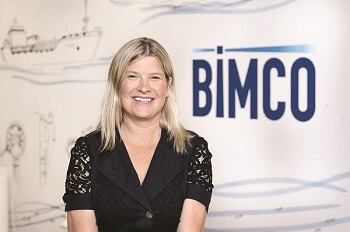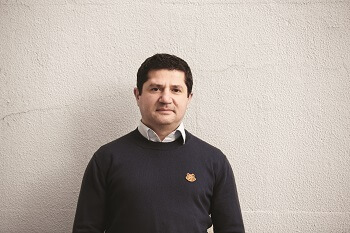Alternative solutions in question in #Issue84 as the industry seeks plastic ban onboard ships
Plastic Ban onboard ships is one of the maritime industry’s themes at the moment, among numerous changes and transitions, and initiatives set to help protect the environment, the oceans and their biodiversity. And while prohibiting single use plastic items onboard ships is in action, it is only reasonable that alternatives are sought to be available and effective.
So is the industry ready to give up the use of plastics onboard? And are the alternatives ready, reliable and trustworthy?
In this edition’s story of Robban Assafina, we go through the impacts of single-use plastics onboard, in light of required actions and available options and regulatory framework, while we show the different perspectives of the industry’s experts and specialists on this underlying matter.
A threat
 |
| Dr. Ashan Silva, Business Manager at GAC Oman - Sohar |
As the global issue of marine plastic litter is growing, basic measures should be taken to protect the environment. According to Dr. Ashan Silva, Business Manager at GAC Oman - Sohar, provider of shipping and logistics services in the Sultanate of Oman, this problem is getting bigger by the day, with the number of plastics dumped into oceans worldwide increasing on a daily basis, and what’s even more alarming is that it is a growing trend, and that volume will double easily within the next ten years.
“If we don’t take aggressive actions as per the IMO recommendations, there will be more plastic than fish in our seas by 2050. Some shipping companies have responded by banning single-use plastics on board, replacing it with alternative solutions such as water dispensers, steel water bottles for all crew, metal straws, reusable fabric and more.”
| Read More: Robban Assafina' Edition Story sheds light on adopting digital solution in ports |
Dr. Silva refers to the importance of cooperation in the light of facing this threat, meaning that isolated efforts alone will not improve the matter to reach the target. “Ship owners, operators and management companies must implement strategies like supplier selection process (supplier selection and registration) to support efforts to reduce the plastic rubbish.
Companies can work with their suppliers to minimise single-use plastics (plastic bottles, wraps, bags, etc.) used by their fleet. Further, where plastic bags and packaging are used onboard, suppliers can collect what is discarded for proper onshore disposal to reduce the risk of it ending up in the sea.”
 |
| Dr. Bev Mackenzie, Head of Intergovernmental Engagement at BIMCO |
Similarly, BIMCO’s Dr. Bev Mackenzie, Head of Intergovernmental Engagement, believes that the shipping industry must play its part in the marine plastics story, as the industry has the potential to be a leader in this area, working for removing and reducing unnecessary plastics on board, as well as advocating for change in how plastic waste is managed on land.
“Even with the best management on board a ship, there is a chance that mismanagement on land means the bottles could still end up in the ocean. We can simply remove this contribution, and the technology exists for us to do so. Onboard drinking water systems are cost-effective, reliable and provide safe water.
BIMCO’s survey showed that many companies have already embraced modern onboard systems and that the reduction in the number of plastic bottles on board ships is significant,” explains Dr. Mackenzie, who believes that there are also other clear benefits to replace plastic bottles with onboard systems. In addition to saving money, onboard water systems help reduce GHG emissions because plastic bottles have a high GHG footprint and a high-water footprint.
A subsidiary to Mouawad Consulting AS, a leading firm in Environmental Engineering with specialization in Ballast Water Management onboard ships, URSA AS, provider of water systems on board, believes that “low-hanging fruit” measures are minimising the use of plastic cutlery onboard, sorting waste to keep plastics alone and deliver them to shore for recycling and replacing plastic potable water bottles with filtration systems. According to Jad Mouawad, CEO of Mouawad Consulting, those measures are not necessarily only applicable to major companies, since any company can cut both cost and environmental footprint by adopting those basic principles.
IMO’s Measures
Seeking regulatory assistance on this matter, Tamar Barabadze, Project Manager, GloLitter Partnerships Project, IMO, explains that Annex V of the International Convention for the Prevention of Pollution from Ships (MARPOL) has banned the disposal of plastics from ships into the sea since 1987. This ban applies to all ships in all areas, but larger ships have additional responsibilities as well. All ships over 100 gross tonnages must have a garbage management plan prepared with instructions for the crew on how to deal with all waste. Ships 12 meters or longer in length are required to post placards to notify crew and passengers of what to do with their waste.
 |
| Tamar Barabadze, Project Manager, GloLitter Partnerships Project, IMO |
She continues: “Ships over 400 gross tonnage or licensed to carry at least 15 passengers must keep a garbage record book, containing the record of time, date, and location of every time garbage is incinerated or discharged, as well as a description of the garbage and an estimate of the amount disposed of. A recent amendment, adopted in 2022, will make this requirement for garbage record books applicable to smaller ships too – those over 100 gross tonnages. MARPOL Annex V also obliges governments to ensure the provision of adequate reception facilities at ports and terminals for the reception of garbage without causing undue delay to ships, and according to the needs of the ships using them.”
| Read More: Maritime communication technology providers urge shipowners to drive crew retention and welfare |
Recognizing that more needs to be done to address the environmental and health problems posed by marine plastic litter, the IMO’s Marine Environment Protection Committee (MEPC) has adopted the IMO Strategy to Address Marine Plastic Litter from Ships, and its related action plan, which aim to strengthen the international framework and compliance with the relevant IMO instructions and achieve zero plastic waste discharges to sea from ships by 2025.
Replacements
However, the ban of plastic use on board might set up certain measurements, with an aim to find alternatives to plastics onboard.
 |
| Jad Mouawad, CEO of Mouawad Consulting |
Recycling in Norway for example, where plastics are sorted by almost everyone, has a maximum efficiency of around 97%, says Mouawad, meaning that rest 3% which makes up thousands of tons, will end up in the oceans as pollution. He explains: “The same applies to ships which will probably have much less efficiency. In our opinion, while educating and enforcing strict garbage sorting rules, shipowners should work towards replacing plastics with other sources that are more sustainable. For example, instead of recycling bottles of water, ship owners should replace them with alternatives like filtration systems which will, more or less, eliminate the use of bottles on a ship.”
Dr. Silva talks of some challenges varying from initial costs of replacing disposable plastics, such as improving water fountains or filters and purification systems, as well as the prices that depend on the data from the market, since traditional petroleum-based plastic items are much cheaper than bioplastic items.
He also points out to some health issues in this regard, like the non-disposable items that need proper cleaning after each use, especially when used by a team: “If the management decides to keep one ceramic cup at the water fountain onboard, there is a risk that inadequate cleaning could lead to the rapid spread of infection or disease. Also, some alternative supplies to replace plastics are not readily available with ship chandlers at some locations.”
Crew Confidence
On the other hand, drinking water quality on board is also an issue, and as per BIMCO’s survey, seafarer acceptance is a particular challenge. For many crew members bottled water is seen as a privilege compared to what might have traditionally been low-quality drinking water systems with excessive use of chemicals that often result in water with a bad taste, says Dr. Mackenzie. There may also be concerns about the safety of the water, particularly for seafarers from countries where drinking tap water is simply not practiced.
However, steps can be taken, according to Dr. Mackenzie, as quality systems are available, minerals can be added, and testing regimes can be put into place to ensure crew confidence, in addition to general awareness raising through onboard posters, display of test results, videos etc. “We have also seen shipowners coming up with more novel approaches such as providing branded refillable bottles, blind tastings, and engaging with medical professionals in countries where there are concerns, ensuring that company leaders will come on board and drink from the onboard system. There are in fact several efforts going on which support crew confidence.”
Assisting in raising the attention to this matter, BIMCO launched a campaign in November last year, to raise awareness and help support the removal of single-use plastic bottles from ships, partnering with Ocean Bottle on co-branded reusable bottles which symbolize the change needed within the shipping industry.
| Read More: Robban Assafina goes through the scene of green solutions, discussing propulsion systems and fuels challenges |
Improving Seafarer Training
Shipping companies indeed have main roles to go for in this procedure, starting from using their websites and other media platforms to raise awareness of the policies they follow regarding plastic litter, says Dr. Silva. “At the same time, their owned and managed vessels must use posters in relevant places to increase the awareness among their onboard crew. Before being assigned to onboard duties, crew members should receive proper training on marine environment about marine plastic litter.
So raising awareness regarding marine plastic litter began to shape many companies’ focus right now, becoming part of their marketing strategy, which, according to Mouawad, lies in establishing their own environmental officer positions, raising awareness through their procurement processes and making it easy for their crew to choose a good alternative in their daily life that reduces the environmental footprint of the ship.
Future of Plastics
Plastic pollution has significant negative impacts on the marine environment and is therefore an area where collaboration is truly embraced. That is why BIMCO is working on a “how to do it” guide to help the entire industry who want to remove plastics truly do so.
However, there are still some gaps that remain in the chain. Due to commercial pressure and costs involved, ships are unlikely to completely eliminate the use of single use plastic, says Dr. Silva. However, authorities can keep up the pressure to regulate the causes of pollution through various rules and regulations within the vessel operating procedures, but only a handful of operators are likely to take proactive action beyond what is mandatory to protect the environment.
“Except for a very few reputed companies, most are primarily driven by their profit margins with minimal interest in pollution reduction. In my opinion, we should address this without wasting any more time through control bodies for immediate action and better results.”
Similarly, and due to lack of proper and cheap alternatives, Mouawad doesn´t expect the maritime industry to stop using plastics completely in the coming period, unless regulatory bodies take action: “We anticipate regulations forbidding plastics of various sorts on ships, similar to what is now enforced in certain countries like India and Kuwait. When it comes to an IMO level, we expect a more proactive action from ship owners.”
| Read More: Ballast Water Treatment systems: The Catalyst to a Better Marine Future |
Prevention Strategies
The IMO Strategy to Address Marine Plastic Litter from Ships, specifically aims to further understand the contribution of ships to marine plastic litter, improve the regulatory framework around enforcement of current prevention strategies, enhance public awareness, education and seafarer training, as well as reducing marine plastic litter from shipping and fisheries, Barabadze says.
In helping the shipping industry to achieve an improved understanding of the regulatory framework associated with marine plastic litter from ships, IMO plays a vital role in this procedure, to support countries in their implementation of IMO measures. Here, Barabadze highlights IMO’s GloLitter Partnerships Project, along with the Food and Agricultural Organization of the United Nations, with initial funding from the Government of Norway via the Norwegian Agency for Development Cooperation, and with BIMCO as a strategic partner, to support global efforts to reduce the plastic footprint of shipping
GloLitter Project
“This project aims to help the maritime transport and fishing sectors move towards a low-plastics future. To achieve this goal, this initiative will assist developing countries to apply best practices for prevention, reduction and control of marine plastic litter from those sectors. Thirty countries are partnering with the GloLitter project, with lead partner countries and partnering countries. With support from the project, countries develop national action plans to address sea-based marine litter. Regional task force meetings bring together countries on a regional basis to share best practices. By involving countries, the industry and strategic partners, GloLitter aims to help make a significant difference.”
But will ships stop using plastics onboard?
The IMO Strategy to Address Marine Plastic Litter from Ships sets a vision to “strengthen the international framework and compliance with the relevant IMO instruments, endeavoring to achieve zero plastic waste discharges to sea from ships by 2025”. Barabadze concludes by saying: “With collaboration and cooperation, and with everyone on board, we can strive to achieve this goal.”
Robban Assafina Magazine, Issue 84, March/ April 2023, Edition Story, pg. 85
| Read Here | |
 |
|







































